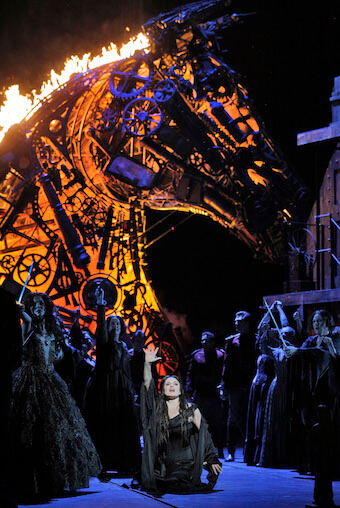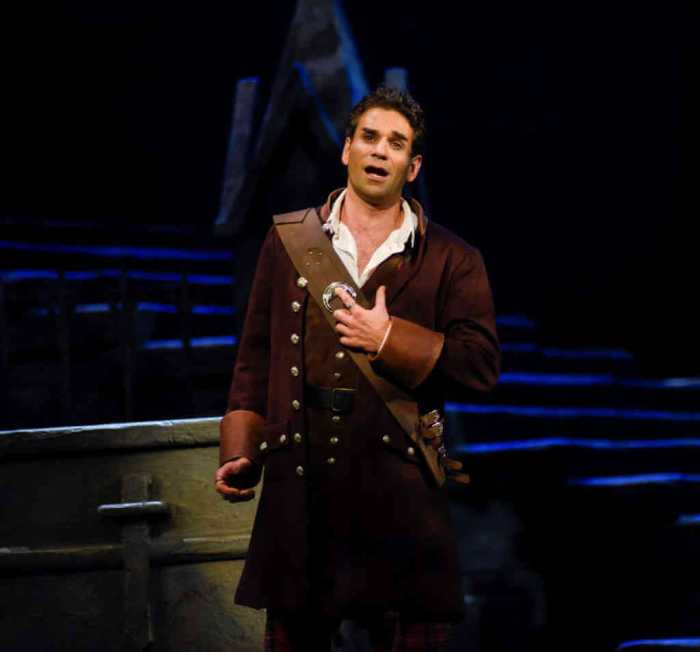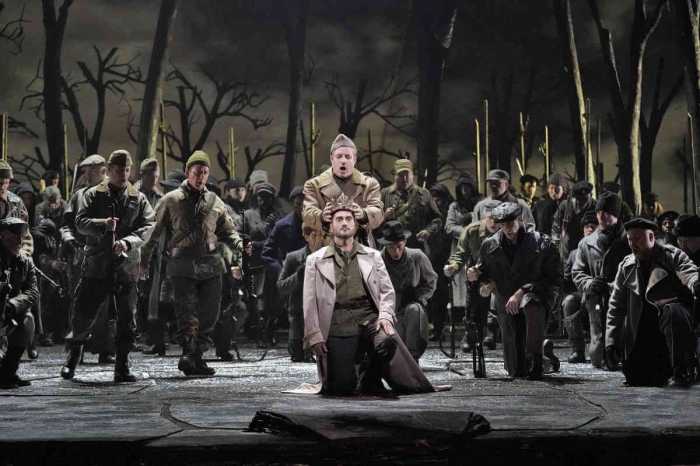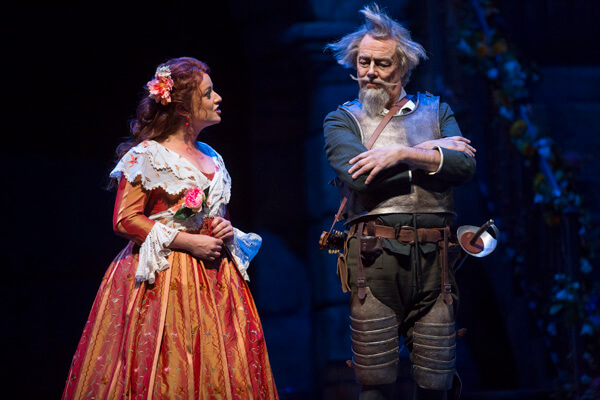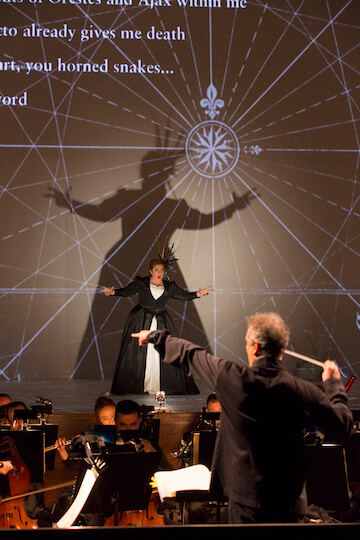Anna Caterina Antonacci in the San Francisco Opera production of Berlioz’s “Les troyens.” | CORY WEAVER/ SAN FRANCISCO OPERA
BY DAVID SHENGOLD | While attending Pride Week and the fabulous Frameline film festival in San Francisco, there’s much opera to enjoy every June. Berlioz’s sublime “Les troyens” represents a monumental undertaking for any company; SFO hadn’t done so since massively cut performances in the 1960s with Régine Crespin. All the more reason to praise Donald Runnicles and his orchestral forces for the magisterial, glowing reading they achieved, powerful in flow yet rich in the magical solo detail Berlioz demands.
On June 25, several patrons who looked as if they’d think nothing of sitting through a five-hour Giants game grumbled about the opera’s length, but most sat enraptured. Runnicles did inflict some cuts, mainly nips and tucks but unwisely including the second half of the great Anna/ Narbal duet.
Set in un-illuminating Crimean/ Franco-Prussian garb, David McVicar’s Covent Garden staging, revived by Leah Hausman, fell rather flat in Troy, save for a well-rendered scene of the women lamenting, but improved vastly in Carthage, though the choreography throughout remained a liability. Dancers and extras alike afforded the usual McVicar plethora of exposed, toned male flesh made central; few complained.
Bay Area Berlioz, Beethoven, and Mozart
Bryan Hymel — acclaimed at the run’s opening — had to cancel the fearsome part of Enée for the third time running. Corey Bix, tall and presentable if understandably not very distinctive dramatically, soldiered colorlessly through three acts but was able to rise considerably to Act IV’s ravishing romantic sequence of numbers with Susan Graham’s lovely Didon and hold his own creditably in the hero’s final scene. Graham, much beloved of this audience, looked queenly and superb and handled the French inspiringly. She cheated a bit on the mountain-climbing climaxes of “Chers tyriens” and had to yell through the testing declamatory scene by the Trojan ships but otherwise gave a remarkably assured and beautiful performance.
Anna Caterina Antonacci offered a passionate, stylishly declaimed Cassandre rich in apt diva plastique; her voice per se remains fascinating yet somewhat opaque, lacking in oomph on either end. McVicar had her writhe on the floor too much and steal focus in the wrenching Andromache episode, which the awkward blocking sorely diminished in visual impact.
“Troyens” requires first-rate singing in many secondary roles. In Chorèbe’s gorgeous music — so loving and so foursquare, opposite Cassandre’s tortured imagination of disaster — Brian Mulligan sounded terrific, lacking only the final Gallic verbal command of a Robert Massard. Sasha Cooke’s Anna — unaccountably dressed like a circus rider — proved rather light vocally but musically and dramatically excellent. Bass-baritone Christian van Horn lacked bass amplitude for Narbal but fared solidly too.
The two featured tenor roles, Iopas and Hylas, won deserved applause for René Barbera — sounding brightly glorious, with a fil de voce on Iopas’ high C — and the lyrical Chong Wang, an assured company Young Artist who also managed to project as the usually inaudible Helenus. Bass Jordan Bisch achieved genuine impact as Ghost of Hector. Ian Roberston’s chorus really excelled; an inspiring evening, with Runnicles — next to Berlioz, that is — its hero.
The San Francisco Orchestra’s semi-staged June operas have provided a new reason to frequent the city at Pride. After a brilliant “Peter Grimes” last year, Michael Tilson Thomas continued the streak with a cleanly, rousingly played “Fidelio” (June 28), by and large inspiringly sung. Blocked but with minimal props and only black outfits and lighting as real scenery, the drama seemed concentrated. Much dialogue — even, alas, when it motivated the subsequent music, as with Act Two’s Prison Trio — vanished in favor of sometimes helpful “clarifications” imported from a staging by director Tatjana Gürbaca.
Nina Stemme made a noble Leonore/ Fidelio, but started without much sheen or steadiness and really only began hitting her stride in her big aria. Act II explained her high reputation in the role. Brandon Jovanovich’s Florestan had clearly been frequenting the prison weight room; though subjected to some kind of “reverb” acoustic in his aria, he showed himself an excellent exponent of this tricky part, with clear, beautiful sound, sufficient agility, and dynamic contrast. Alan Held remains an expert, impactful Pizarro.
Despite some rust and unstellar German, veteran Kevin Langan managed a more than creditable Rocco. Luca Pisaroni’s smooth, emotional Don Fernando represented luxury casting. Joélle Harvey lent Marzelline lovely tone and line but was unaccountably still on book, limiting her expressiveness. The fine lyric tenor Nicholas Phan proved an engaged Jacquino, more than usually audible in ensembles. Even the two Prisoners (Matthew Newlin and Craig Verm) were uncustomarily impressive. “Fidelio,” like “Troyens,” fully deserved the standing ovation that everything in San Francisco gets.
“Le nozze di Figaro” the next day — a pleasant repertory performance, solidly cast but led without much profile or sparkle by Patrick Summers — got one too. The most interesting thing Summers did was to allow his cast to decorate their singing with cadenzas and appoggiaturas, usually judiciously chosen but occasionally straying beyond sense. The staging, over 30 years old, remains handsome — salutary to see actual trees in Act IV these days. Robin Guarino’s direction combined intelligent pointing of text and a few good ideas — like Figaro all but addressing “Non piu andrai” to the Count — with rather too high a quotient of brought-along shtick from the comic foils. The Antonio, vocally appalling, distracted throughout with unfunny upstaging; dismayingly, in Act II’s astonishing ensemble we had an outbreak of the provincial “funny” dance steps I have come to dread.
The good outweighed the bad, though I would have preferred less hard-edged, fan-snapping, knowingly smiling behavior from the cast’s Countess (Nadine Sierra), Susanna (Lisette Oropesa), and Barbarina (Maria Valdes), all attractive young women with attractive voices. Sierra lacked gravitas; Oropesa, spontaneity of utterance — she tended to shade “soubrette” too readily. Her Figaro, Philippe Sly, proved by contrast fascinating, as he continually seemed to be forming phrases as if newly minted. Sly and lankily sexy, he commands superb tonal finish with excellent musicianship; what lacked was sufficient volume for the room. I’d love to hear his Figaro in a first-rate smaller house.
The most satisfying of the principals were Luca Pisaroni’s mercurial Count — tonally fresh and pliable and giving lessons in Italian declamation and detailed facial expression — and the clear-toned, musically secure, and cutesiness-free Cherubino of Angela Brower.
Next summer SFO promises “Jenůfa” with Karita Mattila and Jovanovich in role debuts as Kostelnicka and Laca under JiÅ™í BÄ›lohlávek, “Don Carlo” with a fabulous lineup including Michael Fabiano, Krassimira Stoyanova, René Pape, and Mariusz KwiecieÅ„, plus Calixto Bieito’s US debut directing “Carmen.” Book now!
David Shengold (shengold@yahoo.com) writes about opera for many venues.

